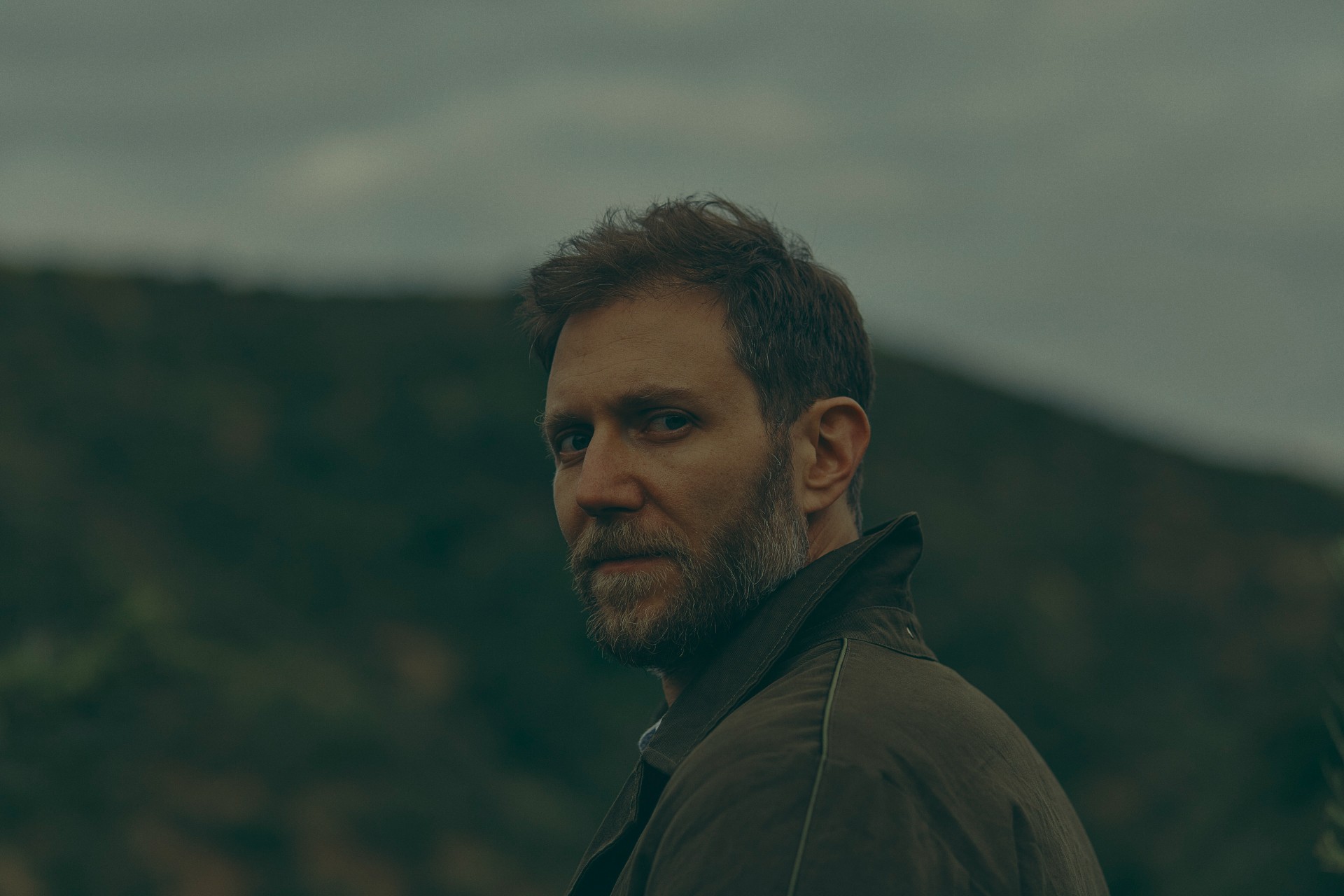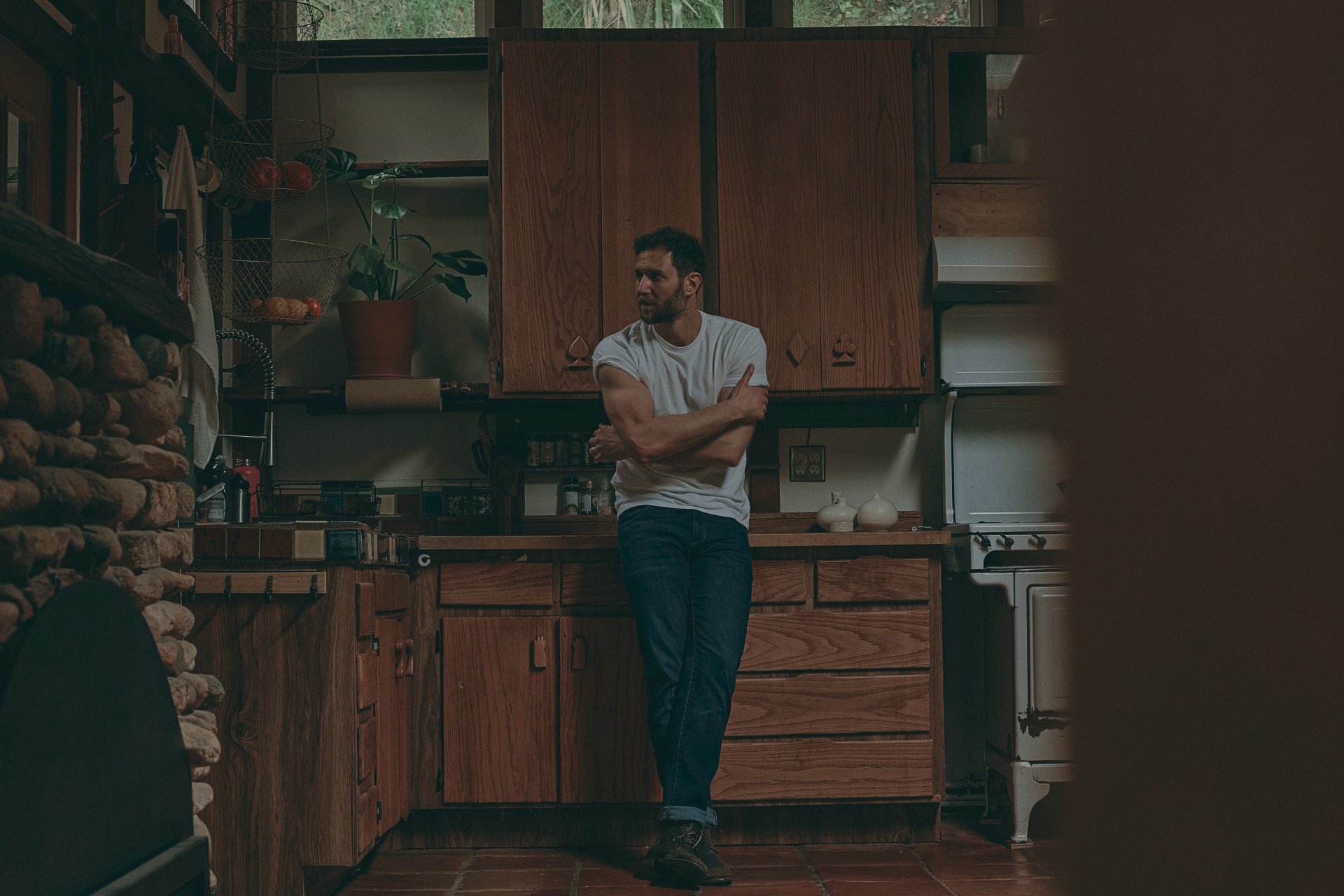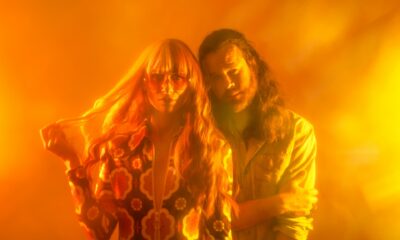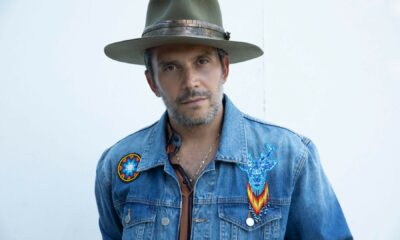Folk
Eddie Berman Interview: Writing, Recording and His Evocative New Album ‘Signal Fire’
Eddie Berman takes time to discuss in detail the writing, recording and music on his upcoming album ‘Signal Fire,’ slated to release on January 19th via Nettwerk.

In the ever-evolving landscape of music, singer-songwriter Eddie Berman stands as a testament to the transformative power of personal experiences and artistic evolution. With his upcoming album Signal Fire, slated to release on January 19th via Nettwerk, Berman beckons listeners into a journey that captures the essence of love, challenges, rebirth, and, most importantly, the profound connections of family.
The second single off the album, “First Of Spring (Kiera’s Song),” resonates as a deeply personal and emotional reflection on the birth of his youngest daughter, illuminating the complexities of parenthood.
As Eddie prepares for the release of Signal Fire, he sat down for a comprehensive Q&A, giving us an in-depth look at his inspirations, the recording process, and his hopes for the album. Dive into the mind of this Portland-based folk-rock troubadour as he delves into the heart of his music.
Eddie, your new album Signal Fire speaks to a journey of rebirth, connection, and the profound connections of family. Can you elaborate on the inspiration behind this album, and how it contrasts with your previous work, Broken English?
Eddie Berman: “Even though I’m always coming up with guitar parts and melodies throughout the year, I take really long breaks between writing any lyrics, sometimes as much as a year. So when I finally start putting words down, there are these months and months’ worth of stuff swirling around in my head. Everything in my personal life, the books I’ve been reading, the things I’ve been listening to, my time out in nature, the insanity of the modern world, etc.
“In the amalgamation of all those things, I think these songs are mainly about the love I feel for my wife, my kids, and the strange, transient lives we find ourselves in. Also, with some of the darker songs on the album, I think they came from the implied flipside of those feelings of love and connection: a kind of fear and alienation of the modern world.
“My last two albums, Frontiers and Broken English, were a bit headier and more philosophical. Signal Fire feels like a return to my senses, in a kind of literal way. Seeing and feeling the profound beauty and love around me, along with the darkness that permeates so many things these days.”
“First of Spring (Keira’s Song)” stands out as a deeply personal song about the birth of your youngest daughter and the challenges she faced. Can you walk us through the emotions you felt during that time and how they translated into this song?
“I had written a song about my first daughter Bridget’s birth and becoming a father for the first time. I had also named my album Before The Bridge after her. So I’ve known for a few years that I needed to write something good for my younger daughter Keira. I had tried to force some songs before, but they never turned out well. I’m not the sort of writer that can really set out saying, ‘I’m going to write about (blank) today.’ It has to be sort of a natural, stream-of-consciousness kind of thing. But when I was writing this new album, I found myself all of a sudden telling the story of her birth, which was initially pretty frightening.
“Immediately out of the womb, she was breathing in this shallow, almost hyperventilating way. The nurses whisked Keira and me out of the delivery room and into a side room to put her on a CPAP machine. Nothing seemed to be helping her, and the hospital was preparing a bed for her in the intensive care unit. And I was told neither my wife or I would be able to see her for at least a couple days. I was terrified for her and couldn’t stomach the idea of having to go back to the delivery room empty-handed.
“But after almost a half an hour, right as the nurse was going to shut off the CPAP machine, Keira took a deep breath, and then another, and another. And they handed her to me, and I brought her back to her mom. So the song is about that experience, and the appreciation I have now for each and every one of her breaths. Even as she’s using that breath to yell at me about how she didn’t want black pepper on the scrambled eggs I just cooked for her.”
The transition from solo home recordings to collaborating in person with your band seems to have played a significant role in shaping Signal Fire. How did reuniting with your bandmates influence the overall sound and feel of the album?
“Before Broken English I had recorded pretty much every other album totally live in the studio with my band. But with everything going a bit sideways in the spring of 2020, I decided to try to record that album remotely. There were definitely certain things I liked about it: being able to be a little more discerning, taking my time with certain arrangements, not having to leave my family for long stretches of time or coordinate bandmate and studio schedules…
“So after Broken English, a part of me felt like maybe I should just record like this from now on. But I decided to at least rehearse the new songs in person with my bandmates and then decide how to proceed. After about ten seconds of playing together it was like fog lifting and I just thought, ‘what the hell was I thinking?’ The point of this kind of music isn’t to be discerning or precise, it’s the opposite of that. It’s about the immediacy and the aliveness, warts and all.
“So in the spirit of all that, we made the album in a very quick and frenetic way. We recorded all 13 songs in just three days. I love recording like that, it keeps you from being too precious about something that you shouldn’t be precious about. I think that aliveness and immediacy comes through in these recordings. It’s just four people in a room together, performing the songs.”
The single “Rolling Over Me” celebrates your long-standing relationship with your wife. How did the evolution of your personal relationships over the years inspire the lyrical and musical themes of Signal Fire?
“I used to write more about the things that upset and worried me rather than the things that brought me joy. But I think something shifted, and on this album I found myself writing about the things that filled me with the most love and the most passion. I only know how to write personal songs, really. So my relationships obviously inform them very intensely.”
Signal Fire was recorded during a rare rainstorm in Los Angeles over a mere three days. How did the environment and the time constraint shape the energy and intensity of the recording sessions?
“These were songs all written up in the Pacific Northwest where I live. So it felt very fitting to come down to Los Angeles (where I was born and raised) and record this album during this absolute torrential rain storm. In the almost 30 years of living down there I don’t know if I had ever seen it rain quite as hard as that. There was just this beautiful feeling of waiting out the storm, with nowhere else to be, hunkering down and recording this album. I think it fit both the spirit of the songs and the spirit of the band.”
The title of your album appears in the song “Mare Imbrium.” Can you delve deeper into the significance of the title Signal Fire and how it embodies the essence of the album?
“I’ve always hated titling things. I write sort of abstract songs that are (at least to me) pretty vast. So I have trouble summing it all up in a few words. But as I was trying to come up with a title for this album, I was listening to each of the songs, and that phrase ‘Signal Fire’ stuck out to me. I don’t want to necessarily talk about what the words mean in the context of the song they’re in, but in hindsight, there was something compelling to me about a dualistic feeling of the signal fire. There’s the inviting warmth of the fire but also the sort of foreboding warning of the smoke and flames. I think maybe the songs on this album operate in that same way.”
Musically, Signal Fire is described as intertwining elements from legends like Nick Drake and Bob Dylan. Who or what were your key influences while crafting this album, and how did they steer its direction?
“For many years, I haven’t really listened to any music that’s close to the style or genres that I play. I don’t actively avoid it, but I definitely don’t seek it out. However, I think there are artists that will always be in my musical DNA. That is definitely Bob Dylan and the fingerpicking of folks like Nick Drake, Dave Van Ronk, and Mississippi John Hurt. Also, songwriters like Leonard Cohen and Randy Newman.”
As a testament to your journey through isolation and return to collaboration, what were the most challenging and rewarding aspects of producing Signal Fire?
“The two most rewarding parts for me have always been the moment I finish writing each song, and then, ultimately the recording process. Both processes feel like this weird marriage of the abstract and subconscious with precision and meticulousness. Even if no one ever heard this album, it would always be this beautiful reminder for me of those three frenetic days in the studio with with Gabe Feenberg, Gabe Davis, Chris Wabich, and Pierre De Reeder as these songs just kind of poured out of us.”
You’ve evolved as an artist over the years, transitioning from different recording environments to diving deep into collaborations. What has remained constant in your approach to music, and what do you believe has been the key to your artistic growth?
“I think my musical career is almost defined by its constants. I’ve played with the same two main collaborators, Gabe Feenberg and Gabe Davis, on all of my albums. I’ve recorded every single album with Pierre De Reeder at his old studio in North Hollywood and now his new studio, 64 Sound, in Highland Park, California. And I write the songs in a very similar manner.
But the one main variable, I suppose, is myself. There have been massive changes and more imperceptible changes in myself over the last ten years. They’ve shifted both my musical inclinations and the depth and breadth of the things that I’ve been compelled to write about. Hopefully, I’ll look back in another decade and feel as far removed as I do now from the first album I made in 2013.”
With the album set to release soon, how do you hope Signal Fire will resonate with fans, especially those who have been following your musical journey from the beginning?
“I’ve always had a very intense recency bias, where I think whatever song I wrote last is the best one I’ve ever written. But I feel that, especially with this album. These songs seem to me like they’re a nice synthesis of my head and my heart, for lack of a better phrase. In my first albums, I had no life experiences, so I could only write from my heart, and then the pendulum swung, and I think I shifted to writing much more cerebral stuff for a few years. But I think I’ve settled into a sweet spot here on Signal Fire. It feels alive and awake to this moment in my life.”
-

 Music1 week ago
Music1 week agoTake That (w/ Olly Murs) Kick Off Four-Night Leeds Stint with Hit-Laden Spectacular [Photos]
-

 Alternative/Rock2 days ago
Alternative/Rock2 days agoThe V13 Fix #011 w/ Microwave, Full Of Hell, Cold Years and more
-

 Alternative/Rock1 week ago
Alternative/Rock1 week agoThe V13 Fix #010 w/ High on Fire, NOFX, My Dying Bride and more
-

 Features1 week ago
Features1 week agoTour Diary: Gen & The Degenerates Party Their Way Across America
-

 Culture1 week ago
Culture1 week agoDan Carter & George Miller Chat Foodinati Live, Heavy Metal Charities and Pre-Gig Meals
-

 Music1 week ago
Music1 week agoReclusive Producer Stumbleine Premieres Beat-Driven New Single “Cinderhaze”
-

 Indie2 days ago
Indie2 days agoDeadset Premiere Music Video for Addiction-Inspired “Heavy Eyes” Single
-

 Alternative/Rock2 weeks ago
Alternative/Rock2 weeks agoThree Lefts and a Right Premiere Their Guitar-Driven Single “Lovulator”

















